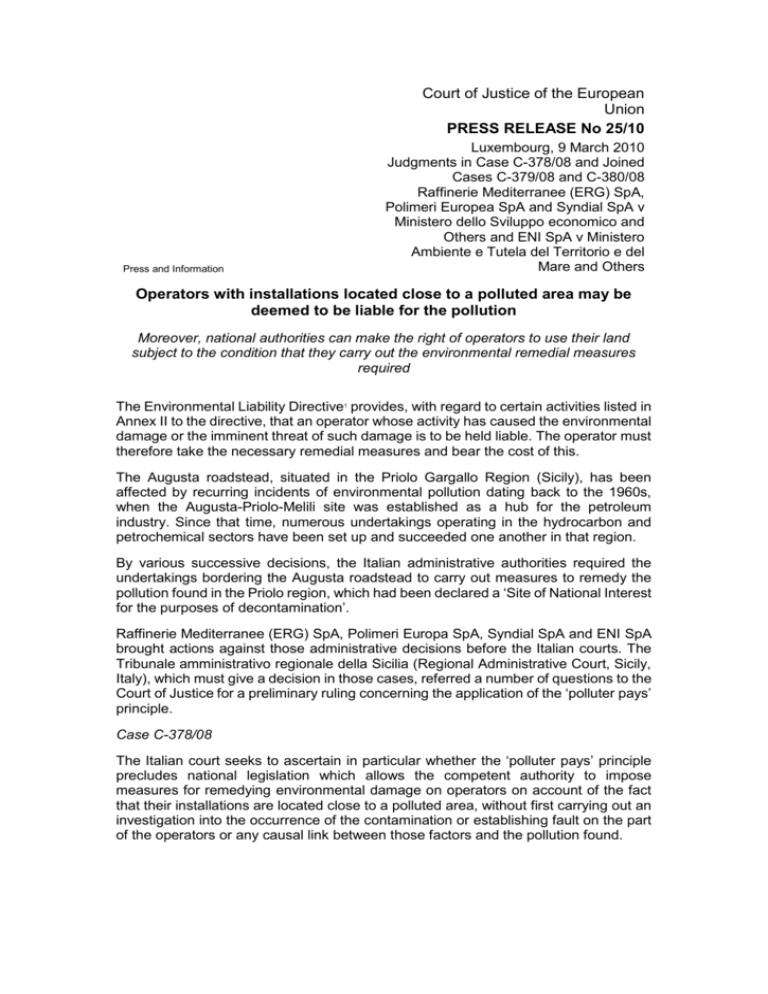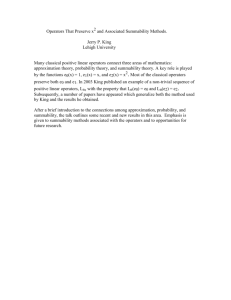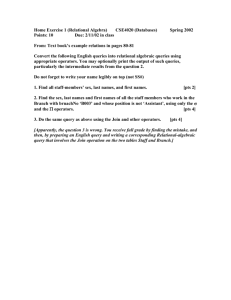DOC - Europa
advertisement

Court of Justice of the European Union PRESS RELEASE No 25/10 Press and Information Luxembourg, 9 March 2010 Judgments in Case C-378/08 and Joined Cases C-379/08 and C-380/08 Raffinerie Mediterranee (ERG) SpA, Polimeri Europea SpA and Syndial SpA v Ministero dello Sviluppo economico and Others and ENI SpA v Ministero Ambiente e Tutela del Territorio e del Mare and Others Operators with installations located close to a polluted area may be deemed to be liable for the pollution Moreover, national authorities can make the right of operators to use their land subject to the condition that they carry out the environmental remedial measures required The Environmental Liability Directive1 provides, with regard to certain activities listed in Annex II to the directive, that an operator whose activity has caused the environmental damage or the imminent threat of such damage is to be held liable. The operator must therefore take the necessary remedial measures and bear the cost of this. The Augusta roadstead, situated in the Priolo Gargallo Region (Sicily), has been affected by recurring incidents of environmental pollution dating back to the 1960s, when the Augusta-Priolo-Melili site was established as a hub for the petroleum industry. Since that time, numerous undertakings operating in the hydrocarbon and petrochemical sectors have been set up and succeeded one another in that region. By various successive decisions, the Italian administrative authorities required the undertakings bordering the Augusta roadstead to carry out measures to remedy the pollution found in the Priolo region, which had been declared a ‘Site of National Interest for the purposes of decontamination’. Raffinerie Mediterranee (ERG) SpA, Polimeri Europa SpA, Syndial SpA and ENI SpA brought actions against those administrative decisions before the Italian courts. The Tribunale amministrativo regionale della Sicilia (Regional Administrative Court, Sicily, Italy), which must give a decision in those cases, referred a number of questions to the Court of Justice for a preliminary ruling concerning the application of the ‘polluter pays’ principle. Case C-378/08 The Italian court seeks to ascertain in particular whether the ‘polluter pays’ principle precludes national legislation which allows the competent authority to impose measures for remedying environmental damage on operators on account of the fact that their installations are located close to a polluted area, without first carrying out an investigation into the occurrence of the contamination or establishing fault on the part of the operators or any causal link between those factors and the pollution found. In its judgment today, the Court finds that the Environmental Liability Directive does not preclude national legislation which allows the competent authority to operate on the presumption that there is a causal link between operators and the pollution found on account of the fact that the operators’ installations are located close to the polluted area. However, in accordance with the ‘polluter pays’ principle, in order for such a causal link to be presumed, that authority must have plausible evidence capable of justifying its presumption, such as the fact that the operator’s installation is located close to the pollution found and that there is a correlation between the pollutants identified and the substances used by the operator in connection with his activities. Directive 2004/35/EC of the European Parliament and of the Council of 21 April 1994 on environmental liability with regard to the prevention and remedying of environmental damage (OJ 1994 L 143, p.56). 1 Moreover, the competent authority is not required to establish fault on the part of operators whose activities are held to be responsible for the environmental damage. On the other hand, that authority must carry out a prior investigation into the origin of the pollution found, and it has a discretion as to the procedures, means to be employed and the length of such an investigation. Joined Cases C-379/08 and C-380/08 The Italian court asks whether the Environmental Liability Directive allows a substantial change in measures for remedying environmental damage which have already been implemented or begun to be put into effect. Moreover, the Italian court seeks to ascertain whether the directive precludes national legislation which makes the right of operators to use their land subject to the condition that they carry out the works required. In its judgment today, the Court finds that the competent authority is permitted to alter substantially measures for remedying environmental damage which were chosen at the conclusion of a procedure carried out on a consultative basis with the operators concerned and which have already been implemented or begun to be put into effect. However, in order to adopt such a decision, that authority must: - give the operators an opportunity to be heard, except where the urgency of the environmental situation requires immediate action on the part of the competent authority; - invite, inter alia, the persons on whose land those measures are to be carried out to submit their observations and take them into account; and - state in its decision the grounds on which its choice is based and, where appropriate, the grounds which justify the fact that there was no need for a detailed examination or that it was not possible to carry out such an examination due, for example, to the urgency of the environmental situation. Similarly, the Court considers that the Environmental Liability Directive does not preclude national legislation which permits the competent authority to make the exercise by operators of the right to use their land subject to the condition that they carry out the environmental remedial works required, even though that land is not affected by those works because it has already been decontaminated or has never been polluted. However, such a measure must be justified by the objective of preventing deterioration of the environmental situation or, pursuant to the precautionary principle, by the objective of preventing the occurrence or resurgence of further environmental damage on the land belonging to the operators which is adjacent to the whole shoreline at which those remedial measures are directed. NOTE: A reference for a preliminary ruling allows the courts and tribunals of the Member States, in disputes which have been brought before them, to refer questions to the Court of Justice about the interpretation of European Union law or the validity of a European Union act. The Court of Justice does not decide the dispute itself. It is for the national court or tribunal to dispose of the case in accordance with the Court’s decision, which is similarly binding on other national courts or tribunals before which a similar issue is raised. Unofficial document for media use, not binding on the Court of Justice. The full texts of the judgments (C-378/08 and C-379/08 and C-380/08 ) are published on the CURIA website on the day of delivery. Press contact: Christopher Fretwell (+352) 4303 3355 Pictures of the delivery of the judgment are available from " Europe by Satellite " (+32) 2 2964106






